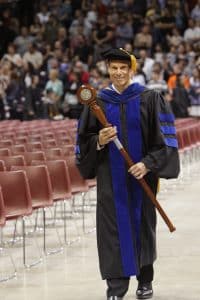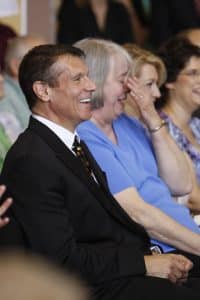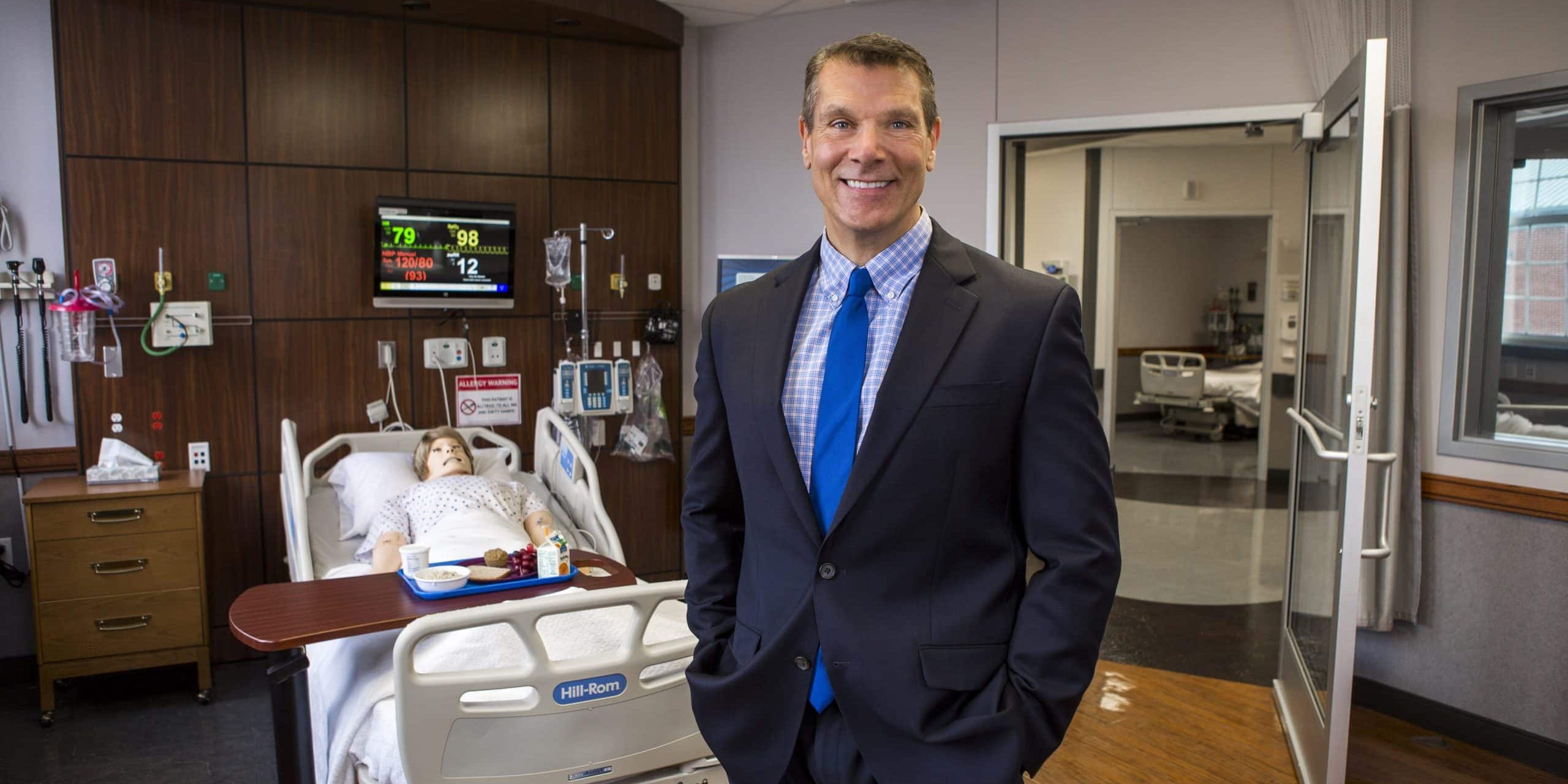Dr. Steven Bishop can sum up his 25-year career at Ozarks Technical Community College with just four words: Lots of happy accidents. Opportunity often came knocking when the soon-to-be-retired provost and vice chancellor of academic affairs didn’t expect it. But every time it did, Bishop took on the challenge, and OTC is better for it.
“I’ve had a great career at OTC. There have been lots of happy accidents and I’m glad I was able to serve as provost,” said Bishop, who will leave the college at the end of January. Dr. Tracy McGrady has been selected as the new provost and vice chancellor.
Starting a career as a respiratory therapist was accidental, Bishop said. When his grandmother was in the hospital in need of care, there weren’t enough therapists for the patients. Respiratory Therapy was a brand new healthcare field, so Bishop went to work at the hospital in respiratory therapy while still in high school in Lexington, Mo as part of a Cooperative Occupational Education program.
“I had never considered working in healthcare until I was offered this job. I ended up loving the work. I didn’t want to do anything else,” he said.
But that changed in 1982, when another one of those happy accidents took place. Graff Vocational Technical School, the technical education arm of Springfield Public Schools, needed someone to teach respiratory therapy. “I was working at Cox Medical Center and they loaned me to the school to help them finish out the semester. I didn’t intend to be a teacher but ended up loving it,” he said.
And when OTC began offering classes in 1991, and absorbed Graff’s role in teaching technical and allied health classes, Bishop joined the OTC faculty and stayed as an instructor until 2000 when he became dean of Allied Health. During his tenure, Allied Health expanded from four programs to 14.
“In Springfield, health care and education are our two biggest employers,” Bishop said. “Hospitals need well-trained people, but it’s hard to get people to move here so we have to train our own people to work in the Ozarks. For every student we graduated, I wanted to be sure that if they took care of my child or my parent I would be confident that they would receive the best care possible.”
Bishop said industry demands influenced which Allied Health programs OTC offered. Some of the programs that developed due to community demand included medical technicians, hearing instrument technicians and behavioral health support.

“I loved Allied Health. My heart was there. But the good thing about making the move was that the same high standards practiced in Allied Health were good for all of the programs no matter what part of the college we’re talking about,” he said.
Dr. McGrady, who will step into Dr. Bishop’s role in January, said watching Dr. Bishop as provost has set a good example for her to follow.
“He has handled the challenges of the job with grace and has always acted in what he believes to be the best interest of our students. Steve, a true teacher at heart, has deep respect for our faculty and has found creative ways to recognize OTC’s many great teachers,” she said.
“I am humbled that Steve has expressed such confidence in my ability to follow him. I have had no greater champion. I’ve been fortunate to have many great mentors throughout my life, but one of my greatest hopes is that I can do the job in a way that makes him proud.”
Dr. Bishop’s legacy will include more than expanding programs and setting high standards. As provost, Dr. Bishop was able to see his dream become a reality with the creation of the Allied Health Clinical Simulation Center, which opened a year after Dr. Bishop became provost.
The Sim Center, as it’s called, features human-like manikins that not only look like humans but replicate human behavior. Bishop called the center his dream and something he wished he had access to when he was learning the job.
“When I was training to become a respiratory therapist, we didn’t even have Resusci-Annie manikins, so I first learned CPR on a hospital patient who had expired after an unsuccessful code blue,” he said. “Things have changed a lot in health care education. At the Sim Center, we can train students in the most realistic way possible before they touch a real person. If you do something wrong in the Sim Center and a manikin ‘dies,’ you can do it again until you’re an expert.”
Michelle Howard, director of the Sim Center, said she will always be thankful and grateful for Bishop’s work in getting the center established.
“The Simulation Center is a gem within our organization. Because of Dr. Bishop’s dream and on-going support of a simulation education at OTC, we graduate some of the most highly skilled and work-ready healthcare students in our community,” she said.
For the past 30 years, you could find Dr. Bishop at least once a day visiting a fitness center. Bishop said, as a medical professional, he wanted to walk the walk, “I always tried to be healthy especially being in health care.”

“I have tried to go out and acknowledge the innovative things happening in our classrooms,” he said. “We can get an outside expert to tell us how to do things but I believe we have plenty of inside experts who are doing great things that we can share with each other.”
Dr. Bishop has worked to improve the health of the college by improving the quality of students the college has produced since its inception and the impact those students, and their training, have on the community.
“Across the board, businesses and our community are better because of OTC,” Bishop said. “Students can get a strong foundation here before they transfer to a 4-year college or university. Our health care systems and our tech industries are stronger because of the college and the quality of the students we send out into the workforce.”

